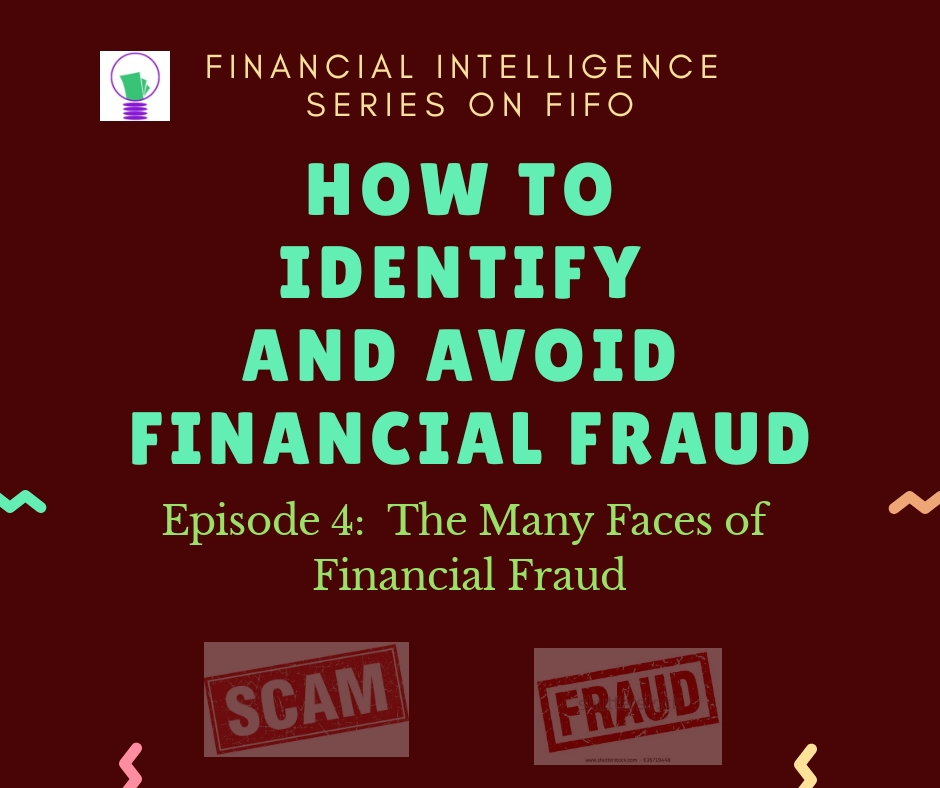Episode 4: The Many Faces of Financial Fraud
Perhaps you may have asked yourself, why do people keep falling for financial fraud? What were they thinking?
The truth is that it is not only the wealthy who are targeted by financial fraudsters. Anyone can be a target, even you.
The best way to shield yourself is by getting smart and becoming aware of the many forms of these frauds so you can avoid being a victim.
It would interest you to know that fraudsters rely on a variety of techniques and tactics to trick consumers out of there money. While some may be quite common and easily recognizable, other are pretty subtle.
Whatever the tactics used, con artists tend to thrive on uncertainty, panic, fear or greed in other to take advantage of the consumer’s weaknesses.
In today’s episode, we’ll consider some of the many ways that financial frauds occur then on the next and last episode, we’ll look into ways to stay safe.
***************
★1. False Stories Meant to Evoke Sympathy
Perhaps this is the most common form on financial scam going on in the streets. You’ll see a well-dressed man approaching you and claiming to have come from a far distance for a conference.
He’ll claim that he has run out of transport money and needs your help. Surprisingly, you discover one hour after helping him that he’s still there begging other people for money too. These are scammers disguised as “professional beggars”. You should beware of them.
★2. Business and Job Opportunity Scams
This is another common form of scam, especially in a society where people are desperate for employment.
Someone may promise to give you a job or connect you with an employment opportunity, if only you will pay a certain sum. In most cases, people have been tricked into paying thousands of Naira with nothing to show for it in the end.
★3. Identity Theft and Impostor Scams.
Here, someone pretends to be a trusted person such as a family member in an emergency, government official, tax agent, your banker or network service provider.
They may call asking for your personal information, credit card details or other sensitive information. Some may call in asking for money outright.
★5. The Allure of Newly Imported, Exotic-sounding Products.
They’ll tell you that this is a new product, a new system that fixes all the errors of the current system and gives you 25% returns on investment.
Whenever you see things like these ask yourself, “if a genuinely groundbreaking product gets developed, what are the odds you’d be given the exclusive chance to invest in it?”
★6. Ponzi Schemes and Peer-to-Peer Donation Platforms
As already explained in Episode one of this series, Ponzi Scheme is another common form of financial fraud which thrives on paying off old investors with the enrollment fees of new investors. It grows mostly by referrals.
Any system that operates on such a pyramid scheme without a tangible product or service to offer almost often collapses. The reason could be a result of a scandal, system crash, delays in payment or rumours of shutdown.
I have observed that any news or incidence that undermines the faith of new potential customers is bound to send the entire system tumbling down. Don’t be a victim.
★7. There are various other faces of Financial Fraud which come in the forms of Investments, Buying and Selling, Email phishing, Attempts to obtain your personal information, unexpected winnings, fake charities, and lots more.
Time and space will fail me to highlight them all.
But I want to refer you to ScamWatch to learn more.
All in all, the easiest way to identify a financial fraud is to keep an eye for any scheme whereby the method used to multiply the investment looks and sounds unconventional, requires little or zero efforts and promises huge returns with no risks so you can acquire unbelievable wealth in little or no time.
Common Characteristics of Financial Scams
Most Financial Scams share some of these characteristics regardless of the tactics used in the Ponzi scheme:
1. A promise of “guaranteed” high returns with little or no risk.
2. Consistent flow of returns regardless of market conditions.
3. Investments platforms or agents that have not been registered with a reputable regulator like the Securities and Exchange Commission (SEC)
4. Clients are not allowed to view official paperwork for their investment or the statement is falsified.
5. Clients face difficulties removing their money when they want it.
6. Information concerning the investment is sketchy, overrates or sound too good to be true.
7. The person approaching you could be a total stranger or someone that has just recently met you.
8. The scammer could also be a trusted, enthusiastic but misinformed family member who relies on your relationship to convince you to get on board.
***************************
That’s how far we can go in this Episode. Anticipate the 5th and final episode soon as I write on how to avoid financial fraud.
Got questions or suggestions? Share your thoughts n the comments below.
.
.
Time to take the bull of your personal finance by the horns. Have you gotten your sample copy of my book How To Save Like A PRO yet?

Pingback: How to Identify and Avoid Financial Fraud 3.0 - FINTEL Coach